- ΤαξινόμησηΠροεπιλεγμένη
Όνομα φωτογραφίας, A → Z
Όνομα φωτογραφίας, Z → A
✔ Ημέρα δημιουργίας, νεότερη → παλαιότερη
Ημέρα δημιουργίας, παλαιότερη → νεότερη
Ημέρα καταχώρησης, πρόσφατη → παλαιότερη
Ημέρα καταχώρησης, παλαιότερη → πρόσφατη
Βαθμολογία κατάταξης, υψηλή → χαμηλή
Βαθμολογία κατάταξης, χαμηλή → υψηλή
Επισκέψεις, περισσότερες → λιγότερες
Επισκέψεις, λιγότερες → περισσότερες - ΓλώσσαAfrikaans Argentina AzÉrbaycanca
á¥áá áá£áá Äesky Ãslenska
áá¶áá¶ááááá à¤à¥à¤à¤à¤£à¥ বাà¦à¦²à¦¾
தமிழ௠à²à²¨à³à²¨à²¡ ภาษาà¹à¸à¸¢
ä¸æ (ç¹é«) ä¸æ (é¦æ¸¯) Bahasa Indonesia
Brasil Brezhoneg CatalÃ
ç®ä½ä¸æ Dansk Deutsch
Dhivehi English English
English Español Esperanto
Estonian Finnish Français
Français Gaeilge Galego
Hrvatski Italiano Îλληνικά
íêµì´ LatvieÅ¡u Lëtzebuergesch
Lietuviu Magyar Malay
Nederlands Norwegian nynorsk Norwegian
Polski Português RomânÄ
Slovenšcina Slovensky Srpski
Svenska Türkçe Tiếng Viá»t
Ù¾Ø§Ø±Ø³Û æ¥æ¬èª ÐÑлгаÑÑки
ÐакедонÑки Ðонгол Ð ÑÑÑкий
СÑпÑки УкÑаÑнÑÑка ×¢×ר×ת
اÙعربÙØ© اÙعربÙØ©
Αρχική / Λευκώματα / Denver RTD 65
Εμφάνιση:
Μηνιαία λίστα
Ημερομηνία ανάρτησης / 2016
Ιανουάριος
Φεβρουάριος
Μάρτιος
Απρίλιος
Μάϊος
Ιούνιος
Ιούλιος
Αύγουστος
Σεπτέμβριος
Οκτώβριος
Νοέμβριος
Δεκέμβριος
Όλα

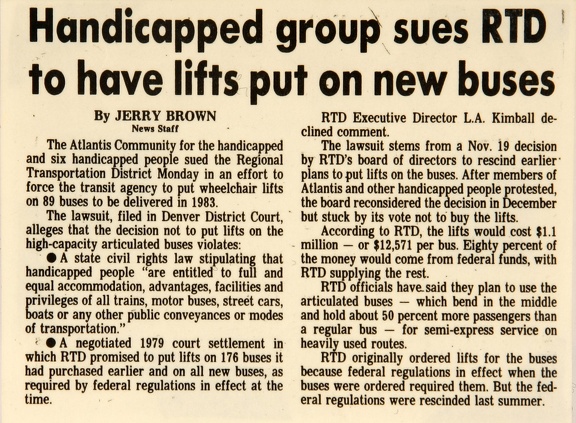 ADAPT (111)
ADAPT (111)
Handicapped group sues RTD to have lifts put on new buses By Jerry Brown, News Staff The Atlantis Community for the handicapped and six handicapped people sued the Regional Transportation District Monday in an effort to force the transit agency to put wheelchair lifts on 89 buses to be delivered in 1983. The lawsuit, filed in Denver District Court, alleges that the decision not to put lifts on the high-capacity articulated buses violates: * A state civil rights law stipulating that handicapped people “are entitled to full and equal accommodation, advantages, facilities and privileges of all trains, motor buses, street cars, boats or any other public conveyances or modes of transportation.” * A negotiated 1979 court settlement in which RTD promised to put lifts on 176 buses it had purchased earlier and on all new buses, as required by federal regulations in effect at the time. RTD Executive Director L.A. Kimball declined comment. The lawsuit stems from a Nov. 19 decision by RTD’s board of directors to rescind earlier plans to put lifts on the buses. After members of Atlantis and other handicapped people protested, the board reconsidered the decision in December but stuck by its vote not to buy the lifts. According to RTD, the lifts would cost $1.1 million – or $ 12,571 per bus. Eighty percent of the money would come from federal funds, with RTD supplying the rest. RTD officials have said they plan to use the articulated buses – which bend in the middle and hold about 50 percent more passengers than a regular bus – for semi-express service on heavily used routes. RTD originally ordered lifts for the buses because federal regulations in effect when the buses were ordered required them. But the federal regulations were rescinded last summer.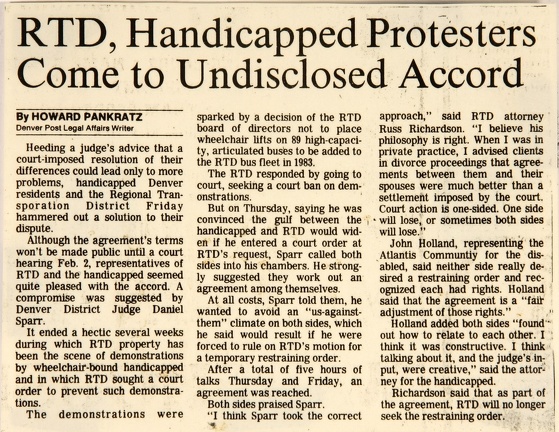 ADAPT (110)
ADAPT (110)
Denver Post RTD, Handicapped Protesters Come to Undisclosed Accord By: Howard Pankratz, Denver Post Legal Affairs Writer Heeding a judge’s advice that a court-imposed resolution of their differences could lead only to more problems, handicapped Denver residents and the Regional Transportation District Friday hammered out a solution to their dispute. Although the agreement’s terms won’t be made public until a court hearing February 2, representatives of RTD and the handicapped seemed quite pleased with the accord. A compromise was suggested by Denver District Judge Daniel Sparr. It ended a hectic several weeks during which RTD property has been the scene of demonstrations by wheelchair-bound handicapped and in which RTD sought a court order to prevent such demonstrations. The demonstrations were sparked by a decision of the RTD board of directors not to place wheelchair lifts on 89 high-capacity, articulated buses to be added to the RTD bus fleet in 1993. The RTD responded by going to court, seeking a court ban on demonstrations. But on Thursday, saying he was convinced the gulf between the handicapped and RTD would widen if he entered a court order at RTD request, Sparr called both sides into his chambers. He strongly suggested they work out an agreement among themselves. At all costs, Sparr told them, he wanted to avoid an “us-against-them” climate on both sides, which he said would result if he were forced to rule on RTD's motion for a temporary restraining order. After a total of five hours of talks Thursday and Friday, an agreement was reached. Both sides praised Sparr. “I think Sparr took the correct approach,” said RTD attorney Russ Richardson. “I believe his philosophy is right. When I was in private practice, I advised clients in divorce proceedings that agreements between them and their spouses were much better than a settlement imposed by the court. Court action is one-sided. One side will lose, or sometimes both sides will lose.” John Holland, representing the Atlantis Community for the disabled, said neither side really desired a restraining order and recognized each had rights. Holland said that the agreement is a “fair adjustment of those rights.” Holland added both sides “found out how to relate to each other. I think talking about it, and the judge’s input, were creative,” said the attorney for the handicapped. Richardson said that as part of the agreement, RTD will no longer seek the restraining order.![ADAPT (109) (4467 επισκέψεις) The Denver Post Friday, Dec. 18, 1981
[Headline] Handicapped Will Protest RTD Wheelc... ADAPT (109)](_data/i/upload/2016/05/10/20160510142135-e4044ea4-sm.jpg) ADAPT (109)
ADAPT (109)
The Denver Post Friday, Dec. 18, 1981 [Headline] Handicapped Will Protest RTD Wheelchair-Lift Ban By George Lane Denver Urban Affairs Writer The board of directors of the Regional Transportation District Thursday made it official – there will be no wheelchair lifts on 89 high-capacity buses expected to be delivered in 1983. The board actually decided a month ago there would be no lifts on the new buses, but they have been hedging on finalizing that action because of objections voiced by the area’s disabled community. Following the vote on the lifts, Wade Blank, co-administrator for the Atlantis Community for the disabled and organizer of the protest against the RTD action, told the transit directors that members of the handicapped community view the action as a violation of their human rights and they will respond to that violation Jan. 4. Blank later said members of the disabled community will be in “training for civil disobedience” between now and Jan. 4. He said beginning Jan. 4, 10 disabled persons in wheelchairs will stage a sit-in in the office of L.A. “Kim” Kimball, RTD’s executive director and general manager. “Everyday during the month of January, 10 disabled people will be occupying Kimball’s office,” Blank said. They won’t have any able-bodied people with them – and if they’re arrested they will be replaced by 10 more. At the conclusion of the board meeting, Kimball told the directors that the RTD staff will take steps to try to prevent this action, but he doesn’t think it proper to discuss those steps at this time. The RTD board during its Nov. 19 meeting voted to save more than a million dollars by not ordering the lifts on the new buses. The RTD staff recommended this action because they said the lifts are expensive (more than $12,000 per bus) and difficult to maintain. The staff proposal was to use the articulated buses on high ridership bus routes, freeing regular buses with wheelchair lifts to provide better service for the handicapped. A delegation from the handicapped community objected to this proposal, with arguments that RTD officials had promised several years ago that 50 percent of the district’s bus fleet would be made accessible to wheelchair-bound riders and all new buses would be ordered with lifts. About 25 disabled persons from Atlantis staged a wheelchair-bound sit-in following the November meeting until Kimball and three board members promised to attempt to get the entire board to reconsider the action. Thursday’s vote was the outcome of that promise.![ADAPT (108) (2004 επισκέψεις) Denver Post (approximately 12/4/81)
[Headline] Bus Life Decision Delayed
By: George Lane
Denver... ADAPT (108)](_data/i/upload/2016/05/10/20160510142110-3b8cd7ce-sm.jpg) ADAPT (108)
ADAPT (108)
Denver Post (approximately 12/4/81) [Headline] Bus Life Decision Delayed By: George Lane Denver Post Urban Affairs Writer Local transit officials, noting that there were barely enough of them to make a quorum Tuesday delayed for two weeks any decision about whether to alter plans not to put wheelchair lifts on 89 new buses. It was suggested during a special Regional Transportation District board meeting that the board order wheelchair lifts on 45 of the 89 high capacity, articulated buses, rather than no lifts at all. Board member Norma Anderson told fellow directors that there was no reason for postponing the issue “when everyone on this board knows the outcome of the vote.”. She said following the meeting there aren’t enough votes on the board to reverse the earlier action, and the buses ultimately will be ordered without the wheelchair lifts. The announced reason for postponing the vote was that only 12 of the 20 board members attended the special meeting, and only 11 were left when the compromise proposal was presented. It takes a minimum of 11 votes for the RTD board to conduct any business. Postponing the action for two weeks could mean that RTD may have to pay some kind of penalty for not informing the bus manufacturer of the lift decision before the extended deadline of Dec. 10. But the board’s action delayed for at least two weeks another possible wheelchair-bound –sit-in following an RTD board meeting last month. About two dozen persons from the Atlantis Community for the disabled staged a 2 1/2 hour sit-in following an RTD board meeting last month. They claimed the board’s decision then not to order the lifts was a “breach of promise” subjecting handicapped bus passengers to second-class ridership. After the RTD officials agreed to hold a special board meeting to reconsider the decision against the lifts, the wheelchair-bound sit-in ended peacefully. It had been feared police force would have to be used to end it. Eighteen handicapped persons and supporters and representatives of disabled people spoke during Tuesday’s special board meeting. RTD officials again attempted to convince the disabled congregation that not putting the lifts on the articulated buses will free other buses with lifts and result in better service to handicapped people.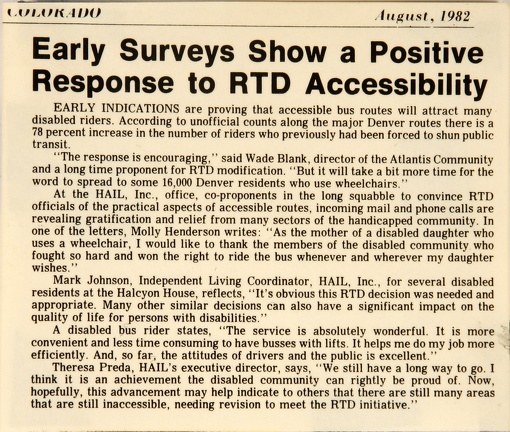 ADAPT (107)
ADAPT (107)
August 1982 Early Surveys Show a Positive Response to RTD Accessibility EARLY INDICATIONS are proving that accessible bus routes will attract many disabled riders. According to unofficial count along the major Denver routes there is a 78 percent increase in the number of riders who previously has been forced to shun public transit. “The response is encouraging,” said Wade Blank, director of the Atlantis Community and a longtime proponent for RTD modification. “But it will take a bit more time for the word to spread to some 16,000 Denver residents who use wheelchairs.” At the HAIL, Inc. office, co-proponents in the long squabble to convince RTD officials of the practical aspects of accessible routes, incoming mail and phone calls are revealing gratification and relief from many sectors of the handicapped community. In one of the letters, Molly Henderson writes: “As the mother of a disabled daughter who uses a wheelchair, I would like to thank the members of the disabled community who fought so hard and won the right to ride the bus whenever and wherever my daughter wishes.” Mark Johnson, Independent Living Coordinator, HAIL, Inc., for several disabled residents at the Halcyon House, reflects, “It’s obvious this RTD decision was need and appropriate. Many other similar decisions can also have a significant impact on the quality of life for persons with disabilities.” A disabled bus rider states, “The service is absolutely wonderful. It is more convenient a less time consuming to have busses with lifts. It helps me do my job more efficiently. And, so far, the attitude of drivers and the public is excellent.” Theresa Preda, HAIL’s executive director, says, “We still have a long way to go. I think it is an achievement the disabled community can rightly be proud of. Now, hopefully, this advancement may help indicate to others that there are still many areas that are still inaccessible, needing revision to meet the RTD initiative.”![ADAPT (106) (1682 επισκέψεις) [Headline] Handicapped Praise Wheelchair Service
Sun. July 12, 1981, Denver, Colo.
Rocky Mountain... ADAPT (106)](_data/i/upload/2016/05/10/20160510142040-a6731907-sm.jpg) ADAPT (106)
ADAPT (106)
[Headline] Handicapped Praise Wheelchair Service Sun. July 12, 1981, Denver, Colo. Rocky Mountain News- 65 (Continued from page 64) Even so, Conrardy said he has heard only one able-bodied passenger complain during his daily commuting trips. Offsetting that experience, Conrardy said, was an incident one afternoon at Colfax and Broadway. A crowded rush-hour bus stopped, and Conrardy said he told the driver he would wait for another bus because that one was too full. But the other passengers made room and invited him aboard, Conrardy said. The fear of hostility from other passengers or simply getting lost has kept some handicapped people from trying the new service, said Laurie Warner, co-director of education for Atlantis. For the couple of minutes it takes the lift to get them on or off the bus, the handicapped passenger is the center of attention for everyone on the bus, Warner said. And that can feel like “being on the grill,” Conrardy said. News Photo by Jose R. Lopez: A man (Mel Conrardy) in a short sleved plaid shirt and kaki pants sits in his motorized wheelchair on the sidewalk, his chin in his hand looking at a big bus. Behind him, further up the sidewalk, a line of people board the bus as the driver holds the door. caption reads: Mel Conrardy waits at Broadway and Colfax for an RTD bus with a wheelchair lift. An organization for the handicapped says the news lifts are a boon for handicapped and can provide an education for the bus drivers and the public, Conrardy says most people are patient during the two minutes it takes for the lift to operate when it is working properly.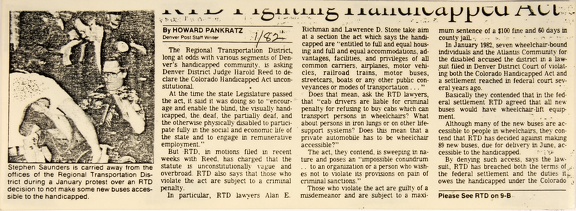 ADAPT (105)
ADAPT (105)
Denver Post 1/82 PHOTO (no credit given): A man in a wheelchair (Stephen Saunders) is tipped back in a wheelie by one man, as another bends forward over his legs and reaches down on the side of his wheelchair. Behind them a couple of police officers are visible. Caption reads: Stephen Saunders is carried away from the offices of the Regional Transportation District during a January protest over an RTD decision to not make some new buses accessible to the handicapped. [Headline] RTD Fighting Handicapped Act By Howard Pankratz Denver Post Staff Writer The Regional Transportation District, long at odds with various segments of Denver’s handicapped community is asking Denver District Judge Harold Reed to declare the Colorado Handicapped Act unconstitutional. At the time the state Legislature passed the act, it said it was doing so to “encourage and enable the blind, the visually handicapped, the deaf, the partially deaf, and the otherwise physically disabled to participate fully in the social and economic life of the state and to engage in remunerative employment.” But RTD in motions filed in recent weeks with Reed, has charged that the statue is unconstitutionally vague and overbroad. RTD also says that those who violate the act are subject to a criminal penalty. In particular, RTD lawyers Alan E. Richman and Lawrence D. Stone take aim at a section the act which says the handicapped are “entitled to full and equal housing and full and equal accommodations, advantages, facilities, and privileges of all common carriers, airplanes, motor vehicles, railroad trains, motor buses, streetcars, boats or any other public conveyances or modes of transportation…” Does that mean, ask the RTD lawyers, that “cab drivers are liable for criminal penalty for refusing to buy cabs which can transport persons in wheelchairs? What about persons in iron lungs or on other life support systems? Does this mean that a private automobile has to be wheelchair accessible?” The act, they contend, is sweeping in nature and poses an “impossible conundrum… to an organization or a person who wishes not to violate its provisions on pain of criminal sanctions.” Those who violate the act are guilty of a misdemeanor and are subject to a maximum sentence of a $100 fine and 60 days in county jail. In January 1982, seven wheelchair-bound individuals and the Atlantis Community for the disabled accused the district in a lawsuit filed in Denver District Court of violating both the Colorado Handicapped Act and a settlement reached in federal court several years ago. Basically they contended that in the federal settlement RTD agreed that all new buses would have wheelchair-lift equipment. Although many of the new buses are accessible to people in wheelchairs, they contend that RTD has decided against making 89 new buses, due for delivery in June, accessible to the handicapped. By denying such access, says the lawsuit, RTD has breached both the terms of the federal settlement and the duties it owes the handicapped under the Colorado ADAPT (104)
ADAPT (104)
Denver Post Tuesday, January 19th, 1982 Editorials, Opinion, 2, 3 Weather 4 Ski Report, 4 Suit over Bus Lifts Hits RTD By Howard Pankratz, Denver Post Legal Affairs Writer Some of Denver’s handicapped, who believe the Regional Transportation District has broken a promise to install wheelchair lifts on 89 new buses, turned that belief into action Monday by suing the district. In a lengthy brief filed in Denver District Court, seven wheelchair-bound individuals and the Atlantis Community for the disabled accused the district of violating both state and civil law and a settlement reached in federal court several years ago. In that settlement, alleges the suit, RTD agreed that all new buses would have wheelchair-lift equipment. But that promise has been broken, said the suit, which asks that RTD be required to install lifts on 89 new buses due for delivery beginning next year and on all new equipment in the future. The Monday suit is based on RTD’s having contracted for 89 new buses, worth $21.3 million. The suit says that 80 percent of the purchase price is to be paid by the federal government. Originally, said lawyer John Holland, who represents the handicapped, all the buses were to have had lifts to make them accessible to the handicapped. But last November, the RTD board decided not to have lifts installed. The total cost of the lifts would be $1.1 million, with the federal government again paying 80 percent of the cost. The suit alleges that it wasn’t the cost, technical feasibility or the maintenance of the lifts that caused them to be dropped, but rather a decision by RTD to use the new buses on “express bus service” from which the handicapped are to be excluded. This, claimed the wheelchair-bound complaints, blatantly violates the state’s civil rights act. Reacting to that alleged broken promise, handicapped individuals demonstrated on the RTD properly, for three straight days in early January, an action that caused the district to go to court seeking an order banning such demonstrations. However, late last week, Denver District Judge Daniel Sparr told both sides he feared that if he issued a restraining order against the handicapped, it would only widen the gulf between the two sides. He noted that the handicapped had legal avenues to follow if they felt a promise had been broken. On Friday, heeding Sparr’s advice, the two sides reached an accord, whose points will be made public February 2. RTD lawyers Alan E. Richman and Russ Richardson said Monday that RTD has a policy of not commenting on such pending lawsuits.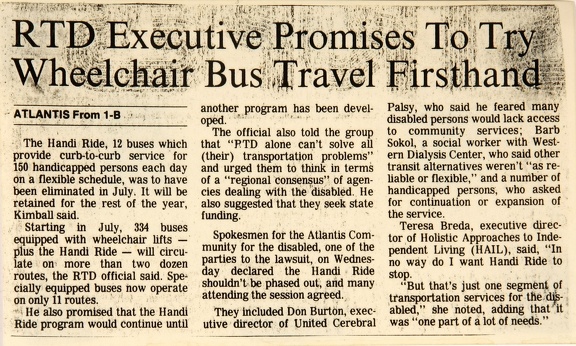 ADAPT (103)
ADAPT (103)
RTD Executive Promises To Try Wheelchair Bus Travel Firsthand ATLANTIS From 1-B The Handi Ride, 12 buses which provide curb-to-curb service for 150 handicapped persons each day on a flexible schedule, was to have been eliminated in July. It will be retained for the rest of the year, Kimball said. Starting in July, 334 buses equipped with wheelchair lifts — plus the Handi Ride - will circulate on more than two dozen routes, the RTD official said. Specially equipped buses now operate on only 11 routes. He also promised that the Handi Ride program would continue until another program has been developed. The official also told the group that “RTD alone can’t solve all (their) transportation problems" and urged them to think in terms of a “regional consensus” of agencies dealing with the disabled. He also suggested that they seek state funding. Spokesmen for the Atlantis Community for the disabled, one of the parties to the lawsuit, on Wednesday declared the Handi Ride shouldn't be phased out, and many attending the session agreed. They included Don Burton, executive director of United Cerebral Palsy, who said he feared many disabled persons would lack access to community services; Barb Sokol, a social worker with Western Dialysis Center, who said other transit alternatives weren't “as reliable or flexible,” and a number of handicapped persons, who asked for continuation or expansion of the service. Teresa Breda, executive director of Holistic Approaches to Independent Living (HAIL), said, “In no way do I want Handi Ride to stop. “But that’s just one segment of transportation services tor the disabled,' she noted, adding that it was “one part of a lot of needs.”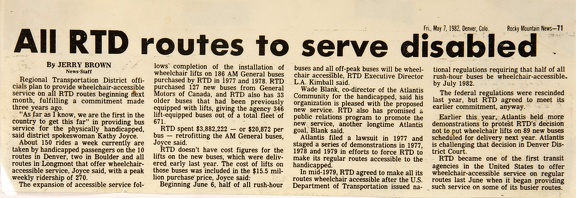 ADAPT (102)
ADAPT (102)
Rocky Mountain News Friday, May 7, 1982 All RTD routes to serve disabled By Jerry Brown News-Staff Regional Transportation District officials plan to provide wheelchair-accessible service on all RTD routes beginning next month, fulfilling a commitment made three years ago. “As far as I know, we are the first in the country to get this far,” in providing bus service for the physically handicapped, said district spokeswoman Kathy Joyce. About 150 rides a week currently are taken by handicapped passengers on the 10 routes in Denver, two in Boulder and all routes in Longmont that offer wheelchair-accessible service, Joyce said, with a peak weekly ridership of 270. The expansion of accessible service follows completion of the installation of wheelchair lifts on 186 AM General buses purchased by RTD in 1977 and 1978. RTD purchased 127 new buses from General Motors of Canada, and RTD also has 33 older buses that had been previously equipped with lifts, giving the agency 346 lift-equipped buses out of a total fleet of 671. RTD spent $3,882,222 - or $20,872 per bus - retrofitting the AM General buses, Joyce said. RTD doesn't have cost figures for the lifts on the new buses, which were delivered early last year. The cost of lifts on those buses was included in the $15.5 million purchase price, Joyce said. Beginning June 6, half of all rush-hour buses and all off-peak buses will be wheelchair accessible, RTD Executive Director L.A. Kimball said. Wade Blank, co-director of the Atlantis Community for the handicapped, said his organization is pleased with the proposed new service. RTD also has promised a public relations program to promote the new service, another longtime Atlantis goal, Blank said. Atlantis filed a lawsuit in 1977 and staged a series of demonstrations in 1977, 1978 and 1979 in efforts to force RTD to make its regular routes accessible to the handicapped. In mid-1979, RTD agreed to make all its routes wheelchair accessible after the U.S. Department of Transportation issued national regulations requiring that half of all rush-hour buses be wheelchair-accessible by July 1982. The federal regulations were rescinded last year, but RTD agreed to meet its earlier commitment, anyway. Earlier Atlantis held more demonstrations to protest RTD’s decision not to put wheelchair lifts on 89 new buses scheduled for delivery next year. Atlantis is challenging that decision in Denver District Court. RTD became one of the first transit agencies in the United States to offer wheelchair-accessible service on regular routes last June when it began providing such service on some of its busier routes.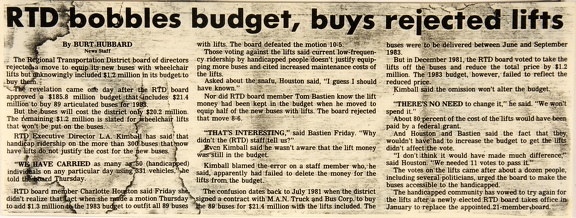 ADAPT (101)
ADAPT (101)
RTD bobbles budget, buys rejected lifts By: Burt Hubbard News Staff The Regional Transportation District board of directors rejected to move to equip its new buses with wheelchair lifts but unknowingly included $1.2 million in its budget to buy them. The revelation came one day after the RTD board approved a $185.8 million budget that includes $21.4 million to buy 89 articulated buses for 1983. But the buses will cost the district only $20.2 million. The remaining $1.2 million is slated for wheelchair lifts that won’t be put on the buses. RTD Executive Director L.A Kimball has said that handicap ridership on the more than 300 buses that now have lifts do not justify the cost for the new buses. “WE HAVE CARRIED as many as 50 (handicapped) individuals on any particular day using 331 vehicles,” he told the board Thursday. RTD board member Charlotte Houston said Friday she didn’t realize that fact when she made a motion Thursday to add $1.3 million to the 1983 budget to outfit all 89 buses with lifts. The board defeated the motion 10-5. Those voting against the lifts said current low-frequency ridership by handicapped people doesn’t justify equipping more buses and cited increased maintenance costs of the lifts. Asked about the snafu, Houston said, “I guess I should have known.” Nor did RTD board member Tom Bastien know the lift money had been kept in the budget when he moved to equip half of the new buses with lifts. The board rejected the move 8-6. “THAT’S INTERESTING,” said Bastien Friday. “Why didn’t the (RTD) staff tell us?” Even Kimball said he wasn’t aware that the lift money was still in the budget. Kimball blamed the error on a staff member who, he said, apparently had failed to delete the money for the lifts from the budget. The confusion dates back to July 1981 when the district signed a contract with M.A.N. Truck and Bus Corp. to buy the 89 buses for $21.4 million with the lifts included. The buses were to be delivered between June and September 1983. But in December 1981, the RTD board voted to take the lifts off the buses and reduce the total price by $1.2 million. The 1983 budget, however, failed to reflect the reduced price. Kimball said the omission won’t alter the budget. “THERE’S NO NEED to change it,” he said. “We won’t spend it.” About 80 percent of the cost of the lifts would have been paid by a federal grant. And Houston and Bastien said the fact that they wouldn’t have had to increase the budget to get the lifts didn’t affect the vote. “I don’t think it would have made much difference,” said Houston. “We needed 11 votes to pass it.” The votes on the lifts came after about a dozen people, including several politicians, urged the board to make the buses accessible to the handicapped. The handicapped community has vowed to try again for the lifts after a newly elected RTD board takes office in January to replace the appointed 21-member board.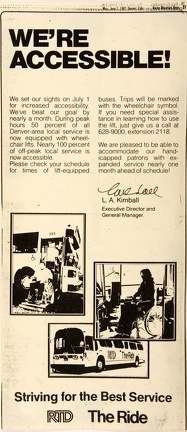 ADAPT (100)
ADAPT (100)
Rocky Mountain News, Mon., June 7, 1982 Denver, Colo. p.37 WE’RE ACCESSIBLE! We set our sights on July 1 for increased accessibility. We've beat our goal by nearly a month. During peak hours 50 percent of all Denver-area local service is now equipped with wheelchair lifts. Nearly 100 percent of off-peak local service is now accessible. Please check your schedule for times of lift-equipped buses. Trips will be marked with the wheelchair symbol. If you need special assistance in learning how to use the lift, just give us a call at 628-9000, extension 2118. We are pleased to be able to accommodate our handicapped patrons with expanded service nearly one month ahead of schedule! (signature) L.A. Kimball Executive Director and General Manager 3 PHOTOS (in clockwise order; no credits given). First: A man in a wheelchair sits on a lift into the front door of a city bus. An access symbol is visible by the driver's door of the bus. Second: A woman in a manual wheelchair entering the front of an accessible bus, by the farebox. Three: An RTD bus with RTD "The Ride" written on the side of the bus. In large print at the bottom it says: Striving for the Best Service RTD The Ride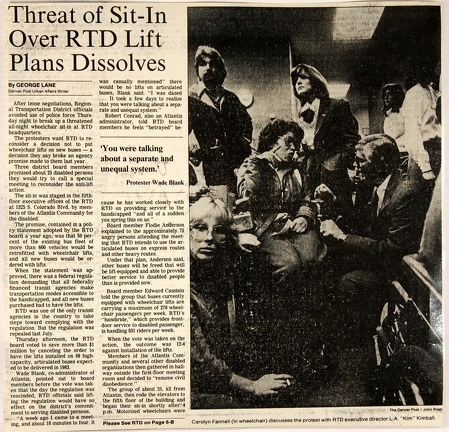 ADAPT (99)
ADAPT (99)
The Denver Post PHOTO by John Prieto, Denver Post: A woman in a wheelchair (Carolyn Finnell) is surrounded four able-bodied persons. One man is kneeling down in front of her to talk with her. Caption reads: Carolyn Fannell (In wheelchair) discusses the protest with RTD executive director L.A. “Klm" Kimball. Boxed Text: "You were talking about a separate and unequal system." -- Protester Wade Blank Threat of Sit-In Over RTD Lift Plans Dissolves By GEORGE LANE, Denver Post Urban Affairs Writer [This story continues on ADAPT 113, but the entire text has been included here for easier reading.] After tense negotiations, Regional Transportation District officials avoided use of police force Thursday night to break up a threatened all-night wheelchair sit-in at RTD headquarters. The protesters want RTD to reconsider a decision not to put wheelchair lifts on new buses — a decision they say broke an agency promise made to them last year. Three district board members promised about 25 disabled persons they would try to call a special meeting to reconsider the anti-lift action. The sit-in was staged in the fifth-floor executive offices of the RTD at 1325 S. Colorado Blvd. by members of the Atlantis Community for the disabled. The promise, contained in a policy statement adopted by the RTD board a year ago, was that 50 percent of the existing bus fleet of more than 600 vehicles would be retrofitted with wheelchair lifts, and all new buses would be ordered with lifts. When the statement was approved, there was a federal regulation demanding that all federally financed transit agencies make transportation modes accessible to the handicapped, and all new buses purchased had to have the lifts. RTD was one of the only transit agencies in the country to take steps toward complying with the regulation. But the regulation was repealed last July. Thursday afternoon, the RTD board voted to save more than $1 million by canceling the order to have the lifts installed on 89 high-capacity, articulated buses expected to be delivered in 1983. Wade Blank, co-administrator of Atlantis, pointed out to board members before the vote was taken that the day the regulation was rescinded, RTD officials said lifting the regulation would have no effect on the district's commitment to serving disabled persons. “A week ago I came to a meeting, and about 10 minutes to four, it was casually mentioned" there would be no lifts on articulated buses, Blank said. "I was dazed... it took a few days to realize that you were talking about a separate and unequal system." Robert Conrad, also an Atlantis administrator, told RTD board members he feels "betrayed" because he has worked closely with RTD on providing service to the handicapped “and all of a sudden you spring this on us." Board member Flodie Anderson explained to the approximately 75 angry persons attending the meeting that RTD intends to use the articulated buses on express routes and other heavy routes. Under that plan, Anderson said, other buses will be freed that will be lift-equipped and able to provide better service to disabled people than is provided now. Board member Edward Cassinis told the group that buses currently equipped with wheelchair lifts are carrying a maximum of 270 wheelchair passengers per week. RTD's “handiride,“ which provides front-door service to disabled passenger, is handling 831 riders per week. When the vote was taken on the action, the outcome was 12-4 against installation of the lifts. Members of the Atlantis Community and several other disabled organizations then gathered ln hallway outside the first-floor meeting room and decided to “resume civil disobedience." The group of about 25, all from Atlantis, then rode the elevators to the fifth floor of the building and began their sit-in shortly after 4 p.m. Motorized wheelchairs were parked in the doorways of the three elevators to make it impossible for them to be used. Shortly after the beginning of the demonstration, Bob West, RTD’s director called for police assistance and paramedics “because we don’t want anybody to get hurt.” The police, however, didn’t arrive for more than an hour and when they did arrive, the negotiating session that would end the sit-in already was in progress in a fifth-floor conference room. During that session, board members Mary Duty, Kathi Williams and Thomas Bastien agreed to try to get their fellow board members to meet again to possibly reconsider the issue. L.A. “Kim” Kimball, RTD’s executive director and general manager, also agreed not to execute the board action until an effort is made to set up the special board meeting. “But I can’t guarantee they will” Kimball added. “We can guarantee that if they don’t, we’ll file suit for breach of promise,” responded Mary Penland, an Atlantis employee. “And we’ll guarantee those articulated buses won’t roll unless they roll over our bodies.”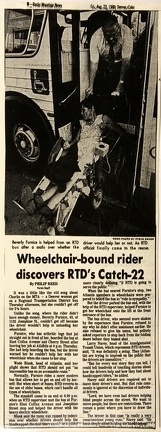 ADAPT (98)
ADAPT (98)
Rocky Mountain News Fri., Aug. 22, 1980 Denver, Colo. PHOTO by News photographer Steve Groer: A woman (Beverly Furnice) lies in a long wheelchair with the footrests extended; she is being put down the stairs of a city bus. A man in shirt sleeves and a tie, lowering her down, is bent almost double as he stands on the top step of the bus. Beverly looks a bit freaked. Beside her, on the side of the bus, the access symbol is painted. Caption reads: Bevery Furnice is helped from an RTD bus after a snafu over whether the driver would help her or not. An RTD official finally came to the rescue. [Headline] Wheelchair-bound rider discovers RTD'5 Catch-22 By PHILIP REED, News Staff It was a little like the old song about Charlie on the MTA - a Denver woman got on a Regional Transportation District bus Thursday afternoon, but she couldn't get off for 2 1/2 hours. Unlike the song, where the rider didn't have enough money, Beverly Furnice, 43, of 1135 Josephine St., couldn't get off because the driver wouldn't help in unloading her wheelchair. Furnice, who has arthritic legs that jut straight out in front of her, boarded the bus at East Colfax Avenue and Cherry Street after leaving her job at Atlantis at 4 p.m. Thursday. She had help boarding the bus, but the driver warned her he couldn’t help her with her wheelchair when she came to her stop. Wade Blank, head of Atlantis, said her plight shows that RTD should not put "an inaccessible bus on an accessible route." Normally, Furnice rides a more modern bus that allows her to get on and off by herself. But when short of buses, RTD reverts to the use of older buses, which can't handle all types of wheelchairs. The standoff came to an end at 6:30 pm when an RTD supervisor met the bus at Furnice’s East Colfax Avenue and Josephine Street stop and helped the driver with the heavy electric wheelchair. Blank said the mess was caused by indecision over whether drivers should help the handicapped. He said there should be a policy more clearly defining if RTD is going to serve the public. When the bus neared Furnlce’s stop, two Atlantis in wheelchairs were prepared to board the bus to “ride in sympathy.” But the driver parked the bus and, with the help of the RTD supervisor, helped Furnice to get her wheelchair onto the lift at the front entrance of the bus. The bus driver, who seemed more shaken by the experience than Furnice, refused to say why he didn't offer assistance earlier. He also refused to give his name, but politely asked reporters to step back from the folding doors before the hissed shut. Larry Narey, head of the Amalgamated Transit Union, which represents RTD drivers, said, “It was definitely a setup. s They (Atlantis) are trying to impress on the public that the drivers are insensitive." “But for every war story they can tell, I could tell hundreds of touching stories about how the drivers help and how they feel about handicapped riders," he added. Narey said drivers are required not to leave their driver's seat. But that rule commonly is ignored at the discretion of individual drivers. "Lord, we have even had drivers helping blind people across the street. We want to move people, but there are restrictions. There comes a point where you have to draw the line. The driver in this case is really a very conscientious young man," Narey said. "He feels deeply about helping the handicapped."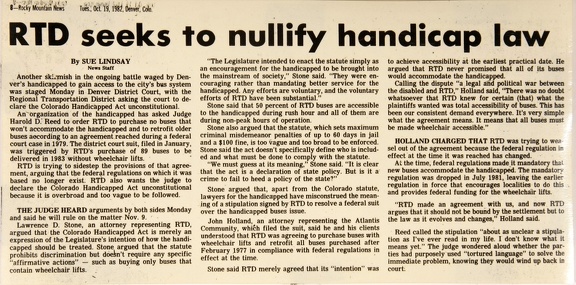 ADAPT (97)
ADAPT (97)
Rocky Mountain News, Tues., Oct. 19, 1992 Denver, Colo. RTD seeks to nullify handicap law By SUE LINDSAY News Staff Another skirmish in the ongoing battle waged by Denver’s handicapped to gain access to the city's bus system was staged Monday in Denver District Court, with the Regional Transportation District asking the court to declare the Colorado Handicapped Act unconstitutional. An organization of the handicapped has asked Judge Harold D. Reed to order RTD to purchase no buses that won't accommodate the handicapped and to retrofit older buses according to an agreement reached during a federal court case in 1979. The district court suit, filed in January, was triggered by RTD’s purchase of 89 buses to be delivered in 1983 without wheelchair lifts. RTD is trying to sidestep the provisions of that agreement, arguing that the federal regulations on which it was based no longer exist. RTD also wants the judge to declare the Colorado Handicapped Act unconstitutional because it is overbroad and too vague to be followed. THE JUDGE HEARD arguments by both sides Monday and said he will rule on the matter Nov. 9. Lawrence D. Stone, an attorney representing RTD, argued that the Colorado Handicapped Act is merely an expression of the Legislature's intention of how the handicapped should be treated. Stone argued that the statute prohibits discrimination but doe§n’t require any specific “affirmative actions” — such as buying only buses that contain wheelchair lifts. “The Legislature intended to enact the statute simply as an encouragement for the handicapped to be brought into the mainstream of society," Stone said. “They were encouraging rather than mandating better service for the handicapped. Any efforts are voluntary, and the voluntary efforts of RTD have been substantial.” Stone said that 50 percent of RTD buses are accessible to the handicapped during rush hour and all of them are during non-peak hours of operation. Stone also argued that the statute, which sets maximum criminal misdemeanor penalties of up to 60 days in jail and a $100 fine, is too vague and too broad to be enforced. Stone said the act doesn’t specifically define who is included and what must be done to comply with the statute. “We must guess at its meaning,” Stone said. "lt is clear that the act is a declaration of state policy. But is it a crime to fail to heed a policy of the state?” Stone argued that, apart from the Colorado statute, lawyers for the handicapped have misconstrued the meaning of a stipulation signed by RTD to resolve a federal suit over the handicapped buses issue. John Holland, an attorney representing the Atlantis Community, which filed the suit, said he and his clients understood that RTD was agreeing to purchase buses with wheelchair lifts and retrofit all buses purchased after February 1977 in compliance with federal regulations in effect at the time. Stone said RTD merely agreed that its “intention” was to achieve accessibility at the earliest practical date. He argued that RTD never promised that all of its buses would accommodate the handicapped. Calling the dispute “a legal and political war between the disabled and RTD," Holland said, "There was no doubt whatsoever that RTD knew for certain (that) what the plaintiffs wanted was total accessibility of buses. This has been our consistent demand everywhere. It's very simple what the agreement means. lt means that all buses must be made wheelchair accessible.” HOLLAND CHARGED THAT RTD was trying to weasel out of the agreement because the federal regulation in effect at the time it was reached has changed. At the time, federal regulations made it mandatory that new buses accommodate the handicapped. The mandatory regulation was dropped in July 1981, leaving the earlier regulation in force that encourages localities to do this and provides federal funding for the wheelchair lifts. “RTD made an agreement with us, and now RTD argues that it should not be bound by the settlement but to the law as it evolves and changes," Holland said. Reed called the stipulation “about as unclear a stipulation as I’ve ever read in my life. I don’t know what it means yet." The judge wondered aloud whether the parties had purposely used “tortured language” to solve the immediate problem, knowing they would wind up back in court.